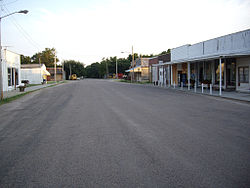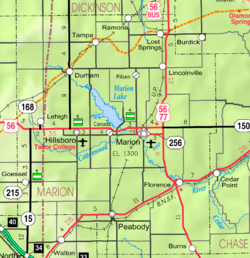|
Durham, Kansas
Durham is a city in Marion County, Kansas, United States.[1] As of the 2020 census, the population of the city was 89.[3] The city took its name from Durham cattle.[4] It is located about 8.5 miles (14 km) north of Hillsboro on the west side of K-15 highway next to a railroad. History Early historyFor many millennia, the Great Plains of North America was inhabited by nomadic Native Americans. From the 16th century to 18th century, the Kingdom of France claimed ownership of large parts of North America. In 1762, after the French and Indian War, France secretly ceded New France to Spain, per the Treaty of Fontainebleau. 19th centuryIn 1802, Spain returned most of the land to France. In 1803, most of the land for modern day Kansas was acquired by the United States from France as part of the 828,000-square-mile (2,140,000 km2) Louisiana Purchase for 2.83 cents per acre (7.0 ¢/ha). In 1806, Zebulon Pike led the Pike Expedition westward from St Louis, Missouri, of which part of their journey followed the Cottonwood River through Marion County near the current cities of Florence, Marion, Durham.[5] From the 1820s to the 1870s, one of the most significant land routes in the United States was the Santa Fe Trail. It was located about 1 mile (1.5 km) northwest of Durham. The trail was active across Marion County from 1821 to 1866.[6] In 1854, the Kansas Territory was organized, then in 1861 Kansas became the 34th U.S. state. In 1855, Marion County was established within the Kansas Territory, which included the land for modern day Durham.[7] In 1887, the Chicago, Kansas and Nebraska Railway built a main line from Herington through Durham to Pratt.[8] In 1888, this line was extended to Liberal. Later, it was extended to Tucumcari, New Mexico and El Paso, Texas. It foreclosed in 1891 and taken over by Chicago, Rock Island and Pacific Railway, which shut down in 1980 and reorganized as Oklahoma, Kansas and Texas Railroad, merged in 1988 with Missouri Pacific Railroad, and finally merged in 1997 with Union Pacific Railroad. Most locals still refer to this railroad as the "Rock Island". A post office was established in Durham Park on June 22, 1874 (near current Cottonwood Grove Christian School northwest of Durham), then it was moved to the community of Durham on September 19, 1887[9] around the time the new railroad was built through the area. 20th centuryIn 1906, Durham incorporated as a city.[10] In 1962, James C. Donahue established the Donahue Corporation, maker of farm implement carriers, and has grown to a 40,000 sq ft (3,700 m2) facility. They have built and distributed over 50,000 implement carriers.[11] It currently is located approximately 0.5 miles (0.8 km) northeast of Durham on 290th St. GeographyDurham is located at coordinates 38.4861202, -97.2280808 in the scenic Flint Hills and Great Plains of the state of Kansas.[1] According to the United States Census Bureau, the city has a total area of 0.20 square miles (0.52 km2), all of it land.[12] ClimateThe climate in this area is characterized by hot, humid summers and generally mild to cool winters. According to the Köppen Climate Classification system, Durham has a humid subtropical climate, abbreviated "Cfa" on climate maps.[13] Area attractionsDurham has one listing on the National Register of Historic Places (NRHP).
Demographics
2020 censusThe 2020 United States census counted 89 people, 49 households, and 33 families in Durham.[16][17] The population density was 511.5 per square mile (197.5/km2). There were 58 housing units at an average density of 333.3 per square mile (128.7/km2).[17][18] The racial makeup was 93.26% (83) white or European American (86.52% non-Hispanic white), 0.0% (0) black or African-American, 2.25% (2) Native American or Alaska Native, 0.0% (0) Asian, 0.0% (0) Pacific Islander or Native Hawaiian, 1.12% (1) from other races, and 3.37% (3) from two or more races.[19] Hispanic or Latino of any race was 8.99% (8) of the population.[20] Of the 49 households, 26.5% had children under the age of 18; 53.1% were married couples living together; 32.7% had a female householder with no spouse or partner present. 28.6% of households consisted of individuals and 22.4% had someone living alone who was 65 years of age or older.[17] The average household size was 1.8 and the average family size was 2.1.[21] The percent of those with a bachelor’s degree or higher was estimated to be 2.2% of the population.[22] 15.7% of the population was under the age of 18, 5.6% from 18 to 24, 24.7% from 25 to 44, 19.1% from 45 to 64, and 34.8% who were 65 years of age or older. The median age was 53.2 years. For every 100 females, there were 102.3 males.[17] For every 100 females ages 18 and older, there were 114.3 males.[17] The 2016-2020 5-year American Community Survey estimates show that the median household income was $40,000 (with a margin of error of +/- $11,322) and the median family income was $46,250 (+/- $12,899).[23] Males had a median income of $41,250 (+/- $29,334).[24] Approximately, 0.0% of families and 7.0% of the population were below the poverty line, including 0.0% of those under the age of 18 and 7.0% of those ages 65 or over.[25][26] 2010 censusAs of the census[27] of 2010, there were 112 people, 48 households, and 34 families residing in the city. The population density was 560.0 inhabitants per square mile (216.2/km2). There were 65 housing units at an average density of 325.0 per square mile (125.5/km2). The racial makeup of the city was 99.1% White and 0.9% from other races. Hispanic or Latino of any race were 4.5% of the population. There were 48 households, of which 25.0% had children under the age of 18 living with them, 66.7% were married couples living together, 4.2% had a female householder with no husband present, and 29.2% were non-families. 25.0% of all households were made up of individuals, and 12.5% had someone living alone who was 65 years of age or older. The average household size was 2.33 and the average family size was 2.79. The median age in the city was 47 years. 20.5% of residents were under the age of 18; 5.5% were between the ages of 18 and 24; 22.4% were from 25 to 44; 27.7% were from 45 to 64; and 24.1% were 65 years of age or older. The gender makeup of the city was 51.8% male and 48.2% female. 2000 censusAs of the census of 2000,[28] there were 114 people, 51 households, and 29 families residing in the city. The population density was 541.7 inhabitants per square mile (209.2/km2). There were 64 housing units at an average density of 304.1 per square mile (117.4/km2). The racial makeup of the city was 98.25% White and 1.75% from two or more races. Hispanic or Latino of any race were 0.88% of the population. There were 51 households, out of which 27.5% had children under the age of 18 living with them, 45.1% were married couples living together, 9.8% had a female householder with no husband present, and 41.2% were non-families. 37.3% of all households were made up of individuals, and 25.5% had someone living alone who was 65 years of age or older. The average household size was 2.24 and the average family size was 2.87. In the city, the population was spread out, with 23.7% under the age of 18, 6.1% from 18 to 24, 19.3% from 25 to 44, 29.8% from 45 to 64, and 21.1% who were 65 years of age or older. The median age was 46 years. For every 100 females, there were 100.0 males. For every 100 females age 18 and over, there were 77.6 males. As of 2000 the median income for a household in the city was $26,875, and the median income for a family was $47,917. Males had a median income of $28,000 versus $25,625 for females. The per capita income for the city was $16,402. No families and 3.1% of the population were below the poverty line, including none under the age of 18 and over age 65. EconomyDurham is home of Donahue Corporation,[11] Jason Wiebe Dairy,[29] Main Street Cafe,[30] G & R Implement, Agri Trails CO-OP. GovernmentThe Durham government consists of a mayor and five council members. The council meets the 1st Tuesday after the 1st Monday of each month at 7PM.[31]
EducationPublicThe community is served by Hillsboro USD 410 public school district. The high school is a member of T.E.E.N., a shared video teaching network between five area high schools.[32] All students attend schools in Hillsboro.
Durham schools were closed through school unification. The Durham Hornets[33] won the Kansas State High School boys class BB basketball championship in 1963.[34] Private
Media
InfrastructureTransportationK-15 highway runs along the east side of the city. Durham is served by the Union Pacific Railroad, formerly the Southern Pacific, and prior, the Chicago, Rock Island and Pacific Railroad. Durham is located on UP's Golden State main line to El Paso, Texas. A Union Pacific Local still serves the Durham Elevator during the Kansas summer harvests. The line was originally built by the Chicago, Kansas and Nebraska Railroad. Utilities
See also
References
Further reading
External linksWikimedia Commons has media related to Durham, Kansas.
|
||||||||||||||||||||||||||||||||||||||||||||||||||||||||||||||||||||||||||||||||||||||||||||||||||||||||||||||||||||



